Report on Tourism Consumer Behaviour, Insights and Decision Processes
VerifiedAdded on 2023/01/11
|13
|4726
|84
Report
AI Summary
This report delves into the multifaceted realm of tourism consumer behavior, examining the various social, cultural, personal, and psychological factors that shape consumer attitudes and decisions within the tourism market. It analyzes these influences, focusing on the decision-making process from the initial recognition of needs to the final evaluation of services. The report also highlights the importance of understanding consumer behavior for marketers, exploring how they can influence each stage of the decision-making process and adapt strategies for both B2B and B2C contexts. Furthermore, it evaluates how different tourism organizations respond to consumer behaviors and emerging trends. The report concludes with an overview of market research methods and their application in the tourism industry, providing a comprehensive understanding of consumer behavior and its implications for effective marketing strategies.
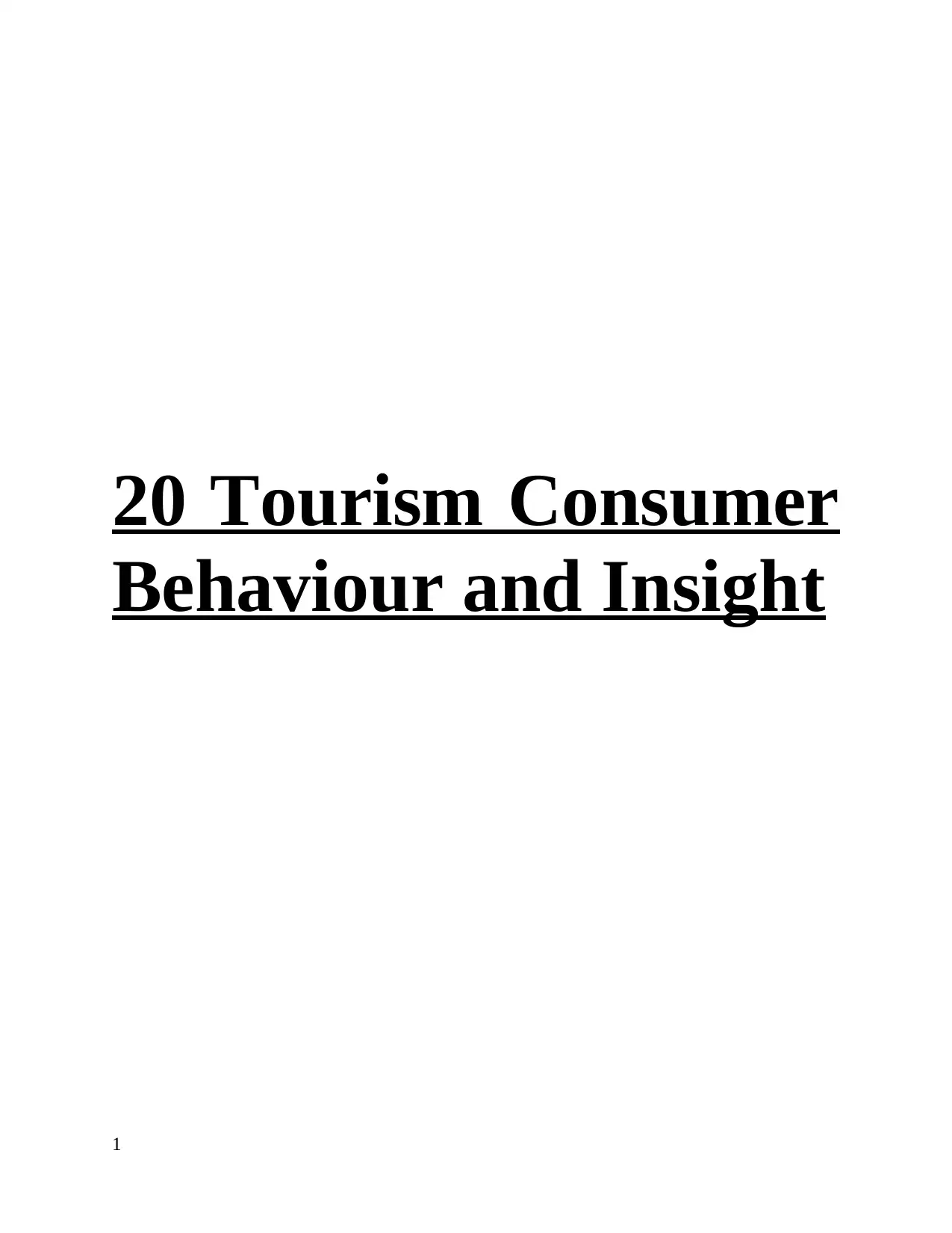
20 Tourism Consumer
Behaviour and Insight
1
Behaviour and Insight
1
Paraphrase This Document
Need a fresh take? Get an instant paraphrase of this document with our AI Paraphraser
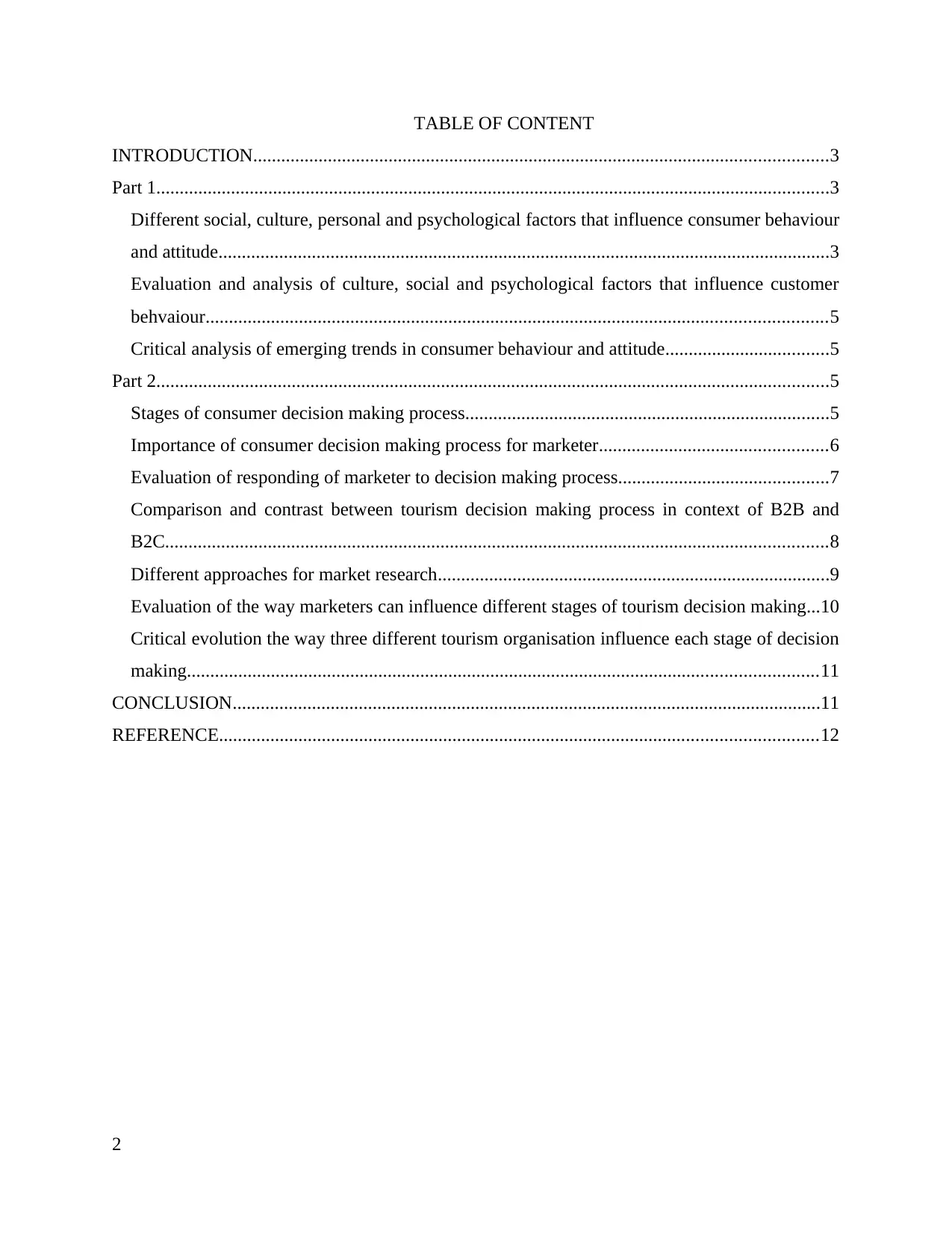
TABLE OF CONTENT
INTRODUCTION...........................................................................................................................3
Part 1................................................................................................................................................3
Different social, culture, personal and psychological factors that influence consumer behaviour
and attitude...................................................................................................................................3
Evaluation and analysis of culture, social and psychological factors that influence customer
behvaiour.....................................................................................................................................5
Critical analysis of emerging trends in consumer behaviour and attitude...................................5
Part 2................................................................................................................................................5
Stages of consumer decision making process..............................................................................5
Importance of consumer decision making process for marketer.................................................6
Evaluation of responding of marketer to decision making process.............................................7
Comparison and contrast between tourism decision making process in context of B2B and
B2C..............................................................................................................................................8
Different approaches for market research....................................................................................9
Evaluation of the way marketers can influence different stages of tourism decision making...10
Critical evolution the way three different tourism organisation influence each stage of decision
making.......................................................................................................................................11
CONCLUSION..............................................................................................................................11
REFERENCE................................................................................................................................12
2
INTRODUCTION...........................................................................................................................3
Part 1................................................................................................................................................3
Different social, culture, personal and psychological factors that influence consumer behaviour
and attitude...................................................................................................................................3
Evaluation and analysis of culture, social and psychological factors that influence customer
behvaiour.....................................................................................................................................5
Critical analysis of emerging trends in consumer behaviour and attitude...................................5
Part 2................................................................................................................................................5
Stages of consumer decision making process..............................................................................5
Importance of consumer decision making process for marketer.................................................6
Evaluation of responding of marketer to decision making process.............................................7
Comparison and contrast between tourism decision making process in context of B2B and
B2C..............................................................................................................................................8
Different approaches for market research....................................................................................9
Evaluation of the way marketers can influence different stages of tourism decision making...10
Critical evolution the way three different tourism organisation influence each stage of decision
making.......................................................................................................................................11
CONCLUSION..............................................................................................................................11
REFERENCE................................................................................................................................12
2
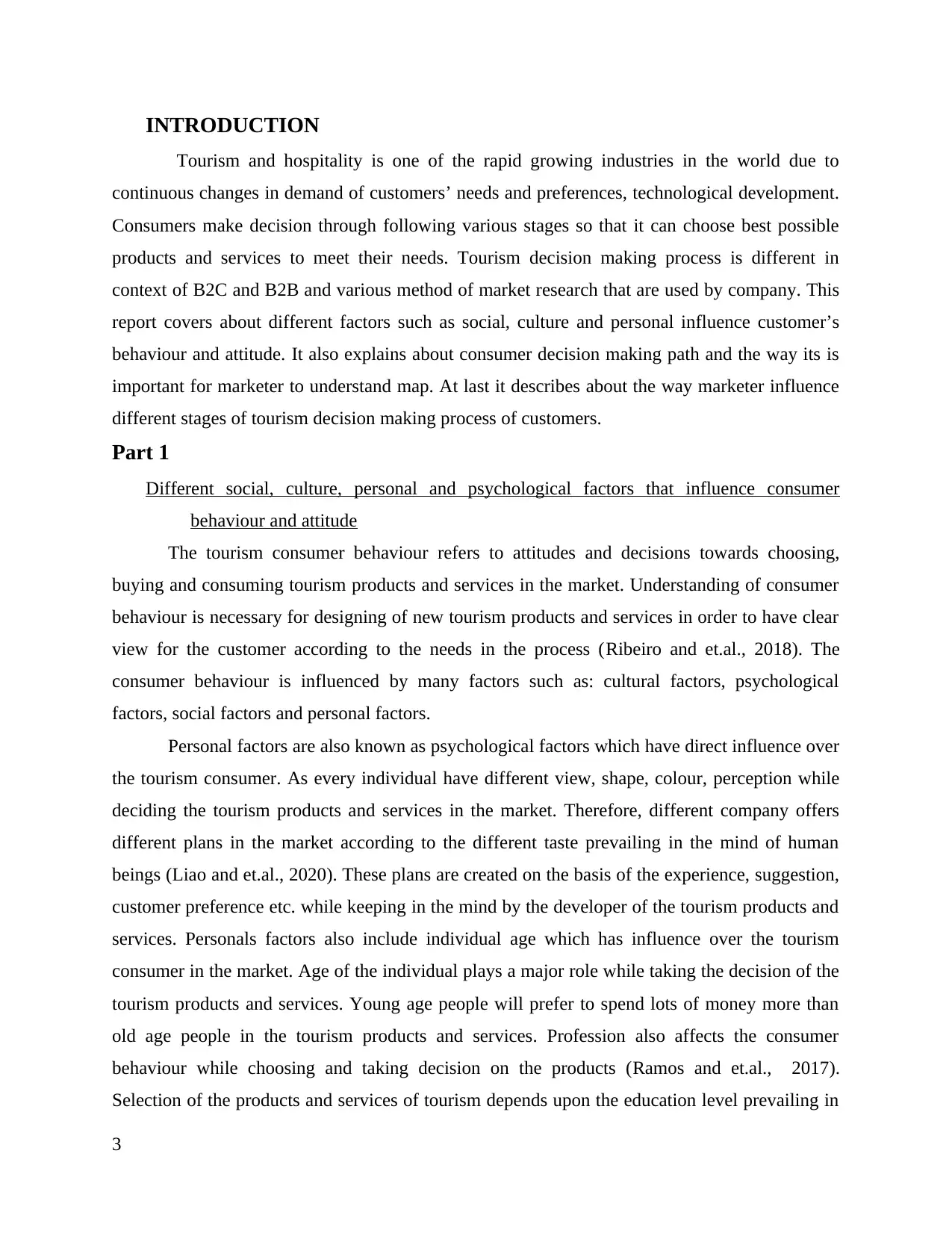
INTRODUCTION
Tourism and hospitality is one of the rapid growing industries in the world due to
continuous changes in demand of customers’ needs and preferences, technological development.
Consumers make decision through following various stages so that it can choose best possible
products and services to meet their needs. Tourism decision making process is different in
context of B2C and B2B and various method of market research that are used by company. This
report covers about different factors such as social, culture and personal influence customer’s
behaviour and attitude. It also explains about consumer decision making path and the way its is
important for marketer to understand map. At last it describes about the way marketer influence
different stages of tourism decision making process of customers.
Part 1
Different social, culture, personal and psychological factors that influence consumer
behaviour and attitude
The tourism consumer behaviour refers to attitudes and decisions towards choosing,
buying and consuming tourism products and services in the market. Understanding of consumer
behaviour is necessary for designing of new tourism products and services in order to have clear
view for the customer according to the needs in the process (Ribeiro and et.al., 2018). The
consumer behaviour is influenced by many factors such as: cultural factors, psychological
factors, social factors and personal factors.
Personal factors are also known as psychological factors which have direct influence over
the tourism consumer. As every individual have different view, shape, colour, perception while
deciding the tourism products and services in the market. Therefore, different company offers
different plans in the market according to the different taste prevailing in the mind of human
beings (Liao and et.al., 2020). These plans are created on the basis of the experience, suggestion,
customer preference etc. while keeping in the mind by the developer of the tourism products and
services. Personals factors also include individual age which has influence over the tourism
consumer in the market. Age of the individual plays a major role while taking the decision of the
tourism products and services. Young age people will prefer to spend lots of money more than
old age people in the tourism products and services. Profession also affects the consumer
behaviour while choosing and taking decision on the products (Ramos and et.al., 2017).
Selection of the products and services of tourism depends upon the education level prevailing in
3
Tourism and hospitality is one of the rapid growing industries in the world due to
continuous changes in demand of customers’ needs and preferences, technological development.
Consumers make decision through following various stages so that it can choose best possible
products and services to meet their needs. Tourism decision making process is different in
context of B2C and B2B and various method of market research that are used by company. This
report covers about different factors such as social, culture and personal influence customer’s
behaviour and attitude. It also explains about consumer decision making path and the way its is
important for marketer to understand map. At last it describes about the way marketer influence
different stages of tourism decision making process of customers.
Part 1
Different social, culture, personal and psychological factors that influence consumer
behaviour and attitude
The tourism consumer behaviour refers to attitudes and decisions towards choosing,
buying and consuming tourism products and services in the market. Understanding of consumer
behaviour is necessary for designing of new tourism products and services in order to have clear
view for the customer according to the needs in the process (Ribeiro and et.al., 2018). The
consumer behaviour is influenced by many factors such as: cultural factors, psychological
factors, social factors and personal factors.
Personal factors are also known as psychological factors which have direct influence over
the tourism consumer. As every individual have different view, shape, colour, perception while
deciding the tourism products and services in the market. Therefore, different company offers
different plans in the market according to the different taste prevailing in the mind of human
beings (Liao and et.al., 2020). These plans are created on the basis of the experience, suggestion,
customer preference etc. while keeping in the mind by the developer of the tourism products and
services. Personals factors also include individual age which has influence over the tourism
consumer in the market. Age of the individual plays a major role while taking the decision of the
tourism products and services. Young age people will prefer to spend lots of money more than
old age people in the tourism products and services. Profession also affects the consumer
behaviour while choosing and taking decision on the products (Ramos and et.al., 2017).
Selection of the products and services of tourism depends upon the education level prevailing in
3
⊘ This is a preview!⊘
Do you want full access?
Subscribe today to unlock all pages.

Trusted by 1+ million students worldwide
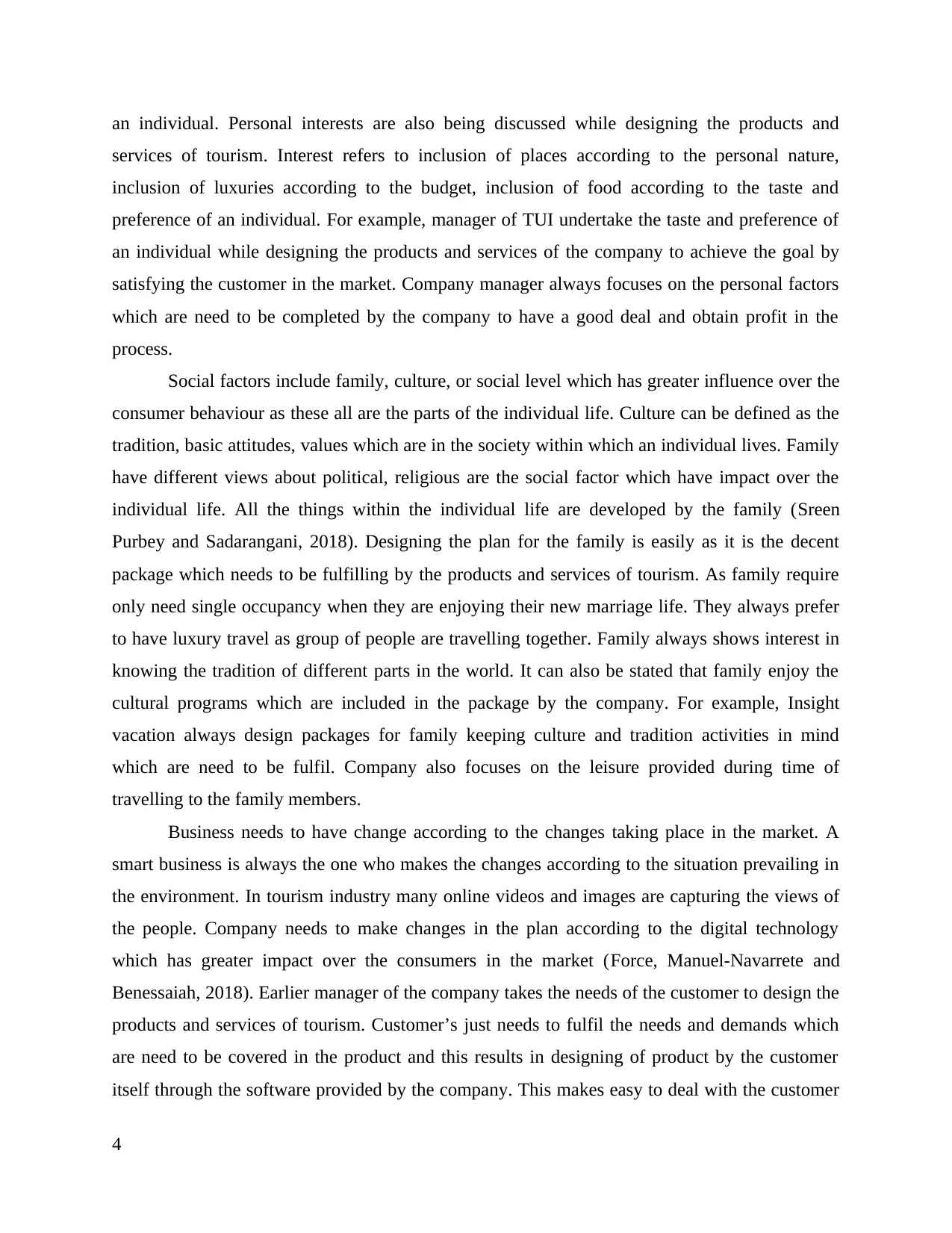
an individual. Personal interests are also being discussed while designing the products and
services of tourism. Interest refers to inclusion of places according to the personal nature,
inclusion of luxuries according to the budget, inclusion of food according to the taste and
preference of an individual. For example, manager of TUI undertake the taste and preference of
an individual while designing the products and services of the company to achieve the goal by
satisfying the customer in the market. Company manager always focuses on the personal factors
which are need to be completed by the company to have a good deal and obtain profit in the
process.
Social factors include family, culture, or social level which has greater influence over the
consumer behaviour as these all are the parts of the individual life. Culture can be defined as the
tradition, basic attitudes, values which are in the society within which an individual lives. Family
have different views about political, religious are the social factor which have impact over the
individual life. All the things within the individual life are developed by the family (Sreen
Purbey and Sadarangani, 2018). Designing the plan for the family is easily as it is the decent
package which needs to be fulfilling by the products and services of tourism. As family require
only need single occupancy when they are enjoying their new marriage life. They always prefer
to have luxury travel as group of people are travelling together. Family always shows interest in
knowing the tradition of different parts in the world. It can also be stated that family enjoy the
cultural programs which are included in the package by the company. For example, Insight
vacation always design packages for family keeping culture and tradition activities in mind
which are need to be fulfil. Company also focuses on the leisure provided during time of
travelling to the family members.
Business needs to have change according to the changes taking place in the market. A
smart business is always the one who makes the changes according to the situation prevailing in
the environment. In tourism industry many online videos and images are capturing the views of
the people. Company needs to make changes in the plan according to the digital technology
which has greater impact over the consumers in the market (Force, Manuel-Navarrete and
Benessaiah, 2018). Earlier manager of the company takes the needs of the customer to design the
products and services of tourism. Customer’s just needs to fulfil the needs and demands which
are need to be covered in the product and this results in designing of product by the customer
itself through the software provided by the company. This makes easy to deal with the customer
4
services of tourism. Interest refers to inclusion of places according to the personal nature,
inclusion of luxuries according to the budget, inclusion of food according to the taste and
preference of an individual. For example, manager of TUI undertake the taste and preference of
an individual while designing the products and services of the company to achieve the goal by
satisfying the customer in the market. Company manager always focuses on the personal factors
which are need to be completed by the company to have a good deal and obtain profit in the
process.
Social factors include family, culture, or social level which has greater influence over the
consumer behaviour as these all are the parts of the individual life. Culture can be defined as the
tradition, basic attitudes, values which are in the society within which an individual lives. Family
have different views about political, religious are the social factor which have impact over the
individual life. All the things within the individual life are developed by the family (Sreen
Purbey and Sadarangani, 2018). Designing the plan for the family is easily as it is the decent
package which needs to be fulfilling by the products and services of tourism. As family require
only need single occupancy when they are enjoying their new marriage life. They always prefer
to have luxury travel as group of people are travelling together. Family always shows interest in
knowing the tradition of different parts in the world. It can also be stated that family enjoy the
cultural programs which are included in the package by the company. For example, Insight
vacation always design packages for family keeping culture and tradition activities in mind
which are need to be fulfil. Company also focuses on the leisure provided during time of
travelling to the family members.
Business needs to have change according to the changes taking place in the market. A
smart business is always the one who makes the changes according to the situation prevailing in
the environment. In tourism industry many online videos and images are capturing the views of
the people. Company needs to make changes in the plan according to the digital technology
which has greater impact over the consumers in the market (Force, Manuel-Navarrete and
Benessaiah, 2018). Earlier manager of the company takes the needs of the customer to design the
products and services of tourism. Customer’s just needs to fulfil the needs and demands which
are need to be covered in the product and this results in designing of product by the customer
itself through the software provided by the company. This makes easy to deal with the customer
4
Paraphrase This Document
Need a fresh take? Get an instant paraphrase of this document with our AI Paraphraser
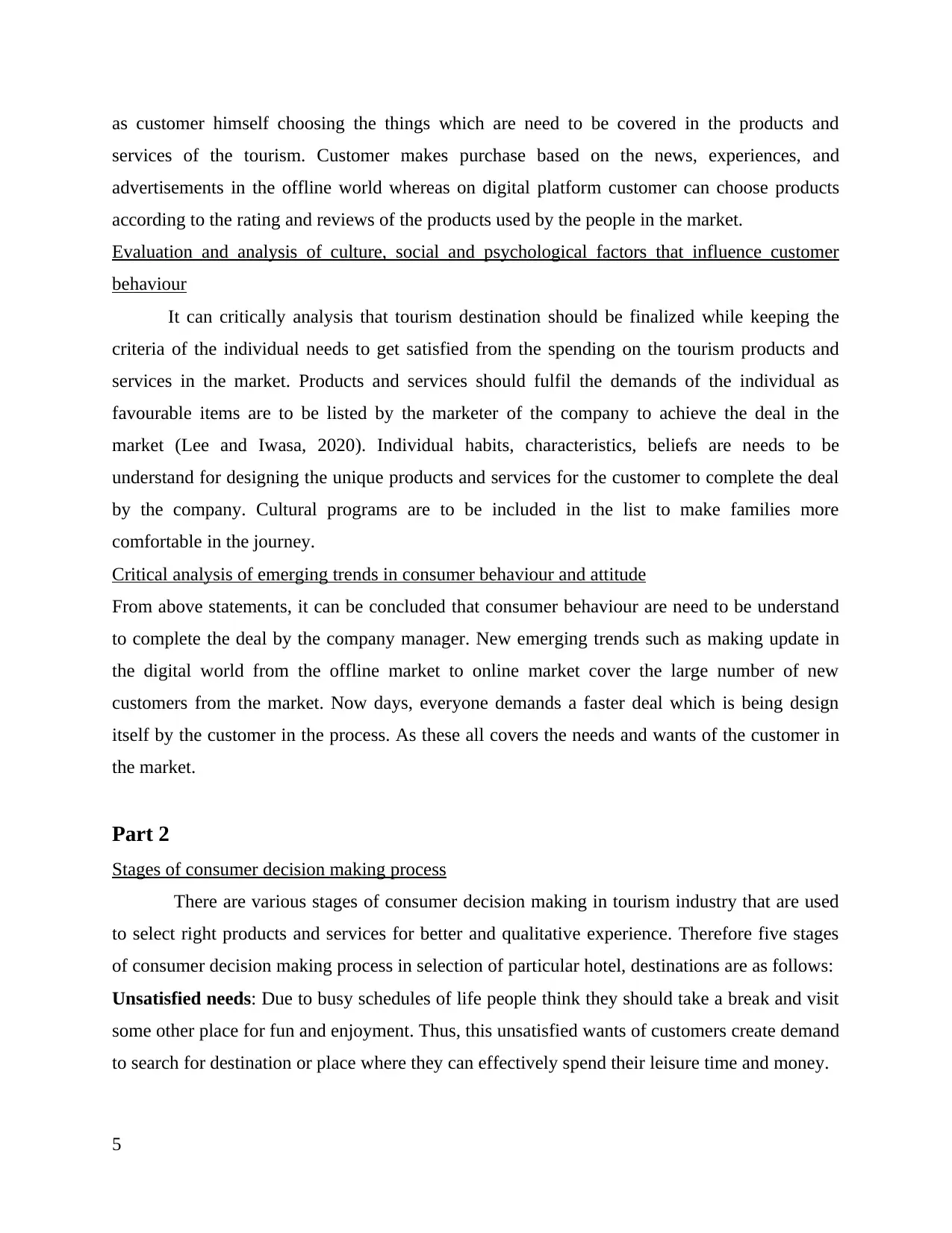
as customer himself choosing the things which are need to be covered in the products and
services of the tourism. Customer makes purchase based on the news, experiences, and
advertisements in the offline world whereas on digital platform customer can choose products
according to the rating and reviews of the products used by the people in the market.
Evaluation and analysis of culture, social and psychological factors that influence customer
behaviour
It can critically analysis that tourism destination should be finalized while keeping the
criteria of the individual needs to get satisfied from the spending on the tourism products and
services in the market. Products and services should fulfil the demands of the individual as
favourable items are to be listed by the marketer of the company to achieve the deal in the
market (Lee and Iwasa, 2020). Individual habits, characteristics, beliefs are needs to be
understand for designing the unique products and services for the customer to complete the deal
by the company. Cultural programs are to be included in the list to make families more
comfortable in the journey.
Critical analysis of emerging trends in consumer behaviour and attitude
From above statements, it can be concluded that consumer behaviour are need to be understand
to complete the deal by the company manager. New emerging trends such as making update in
the digital world from the offline market to online market cover the large number of new
customers from the market. Now days, everyone demands a faster deal which is being design
itself by the customer in the process. As these all covers the needs and wants of the customer in
the market.
Part 2
Stages of consumer decision making process
There are various stages of consumer decision making in tourism industry that are used
to select right products and services for better and qualitative experience. Therefore five stages
of consumer decision making process in selection of particular hotel, destinations are as follows:
Unsatisfied needs: Due to busy schedules of life people think they should take a break and visit
some other place for fun and enjoyment. Thus, this unsatisfied wants of customers create demand
to search for destination or place where they can effectively spend their leisure time and money.
5
services of the tourism. Customer makes purchase based on the news, experiences, and
advertisements in the offline world whereas on digital platform customer can choose products
according to the rating and reviews of the products used by the people in the market.
Evaluation and analysis of culture, social and psychological factors that influence customer
behaviour
It can critically analysis that tourism destination should be finalized while keeping the
criteria of the individual needs to get satisfied from the spending on the tourism products and
services in the market. Products and services should fulfil the demands of the individual as
favourable items are to be listed by the marketer of the company to achieve the deal in the
market (Lee and Iwasa, 2020). Individual habits, characteristics, beliefs are needs to be
understand for designing the unique products and services for the customer to complete the deal
by the company. Cultural programs are to be included in the list to make families more
comfortable in the journey.
Critical analysis of emerging trends in consumer behaviour and attitude
From above statements, it can be concluded that consumer behaviour are need to be understand
to complete the deal by the company manager. New emerging trends such as making update in
the digital world from the offline market to online market cover the large number of new
customers from the market. Now days, everyone demands a faster deal which is being design
itself by the customer in the process. As these all covers the needs and wants of the customer in
the market.
Part 2
Stages of consumer decision making process
There are various stages of consumer decision making in tourism industry that are used
to select right products and services for better and qualitative experience. Therefore five stages
of consumer decision making process in selection of particular hotel, destinations are as follows:
Unsatisfied needs: Due to busy schedules of life people think they should take a break and visit
some other place for fun and enjoyment. Thus, this unsatisfied wants of customers create demand
to search for destination or place where they can effectively spend their leisure time and money.
5
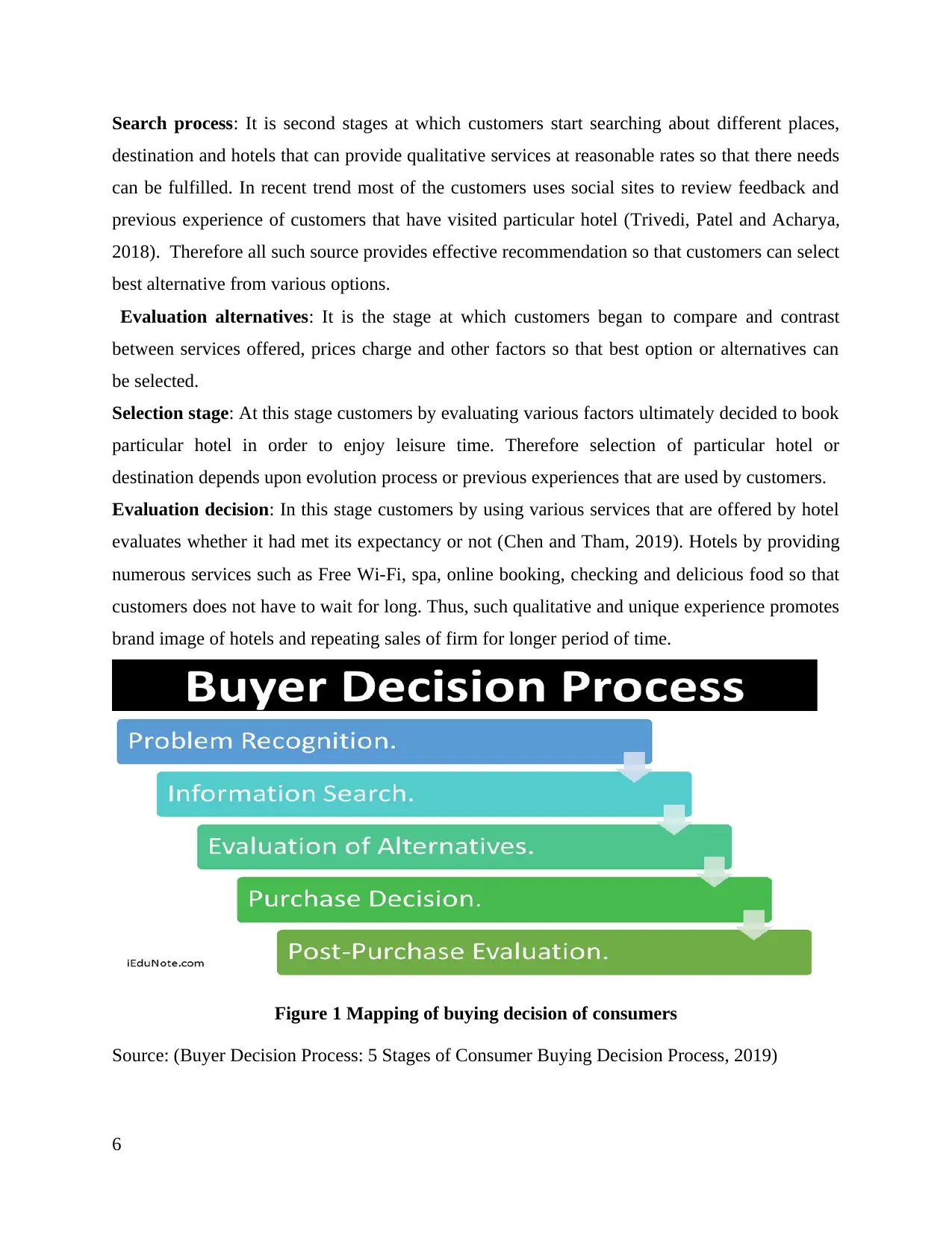
Search process: It is second stages at which customers start searching about different places,
destination and hotels that can provide qualitative services at reasonable rates so that there needs
can be fulfilled. In recent trend most of the customers uses social sites to review feedback and
previous experience of customers that have visited particular hotel (Trivedi, Patel and Acharya,
2018). Therefore all such source provides effective recommendation so that customers can select
best alternative from various options.
Evaluation alternatives: It is the stage at which customers began to compare and contrast
between services offered, prices charge and other factors so that best option or alternatives can
be selected.
Selection stage: At this stage customers by evaluating various factors ultimately decided to book
particular hotel in order to enjoy leisure time. Therefore selection of particular hotel or
destination depends upon evolution process or previous experiences that are used by customers.
Evaluation decision: In this stage customers by using various services that are offered by hotel
evaluates whether it had met its expectancy or not (Chen and Tham, 2019). Hotels by providing
numerous services such as Free Wi-Fi, spa, online booking, checking and delicious food so that
customers does not have to wait for long. Thus, such qualitative and unique experience promotes
brand image of hotels and repeating sales of firm for longer period of time.
Figure 1 Mapping of buying decision of consumers
Source: (Buyer Decision Process: 5 Stages of Consumer Buying Decision Process, 2019)
6
destination and hotels that can provide qualitative services at reasonable rates so that there needs
can be fulfilled. In recent trend most of the customers uses social sites to review feedback and
previous experience of customers that have visited particular hotel (Trivedi, Patel and Acharya,
2018). Therefore all such source provides effective recommendation so that customers can select
best alternative from various options.
Evaluation alternatives: It is the stage at which customers began to compare and contrast
between services offered, prices charge and other factors so that best option or alternatives can
be selected.
Selection stage: At this stage customers by evaluating various factors ultimately decided to book
particular hotel in order to enjoy leisure time. Therefore selection of particular hotel or
destination depends upon evolution process or previous experiences that are used by customers.
Evaluation decision: In this stage customers by using various services that are offered by hotel
evaluates whether it had met its expectancy or not (Chen and Tham, 2019). Hotels by providing
numerous services such as Free Wi-Fi, spa, online booking, checking and delicious food so that
customers does not have to wait for long. Thus, such qualitative and unique experience promotes
brand image of hotels and repeating sales of firm for longer period of time.
Figure 1 Mapping of buying decision of consumers
Source: (Buyer Decision Process: 5 Stages of Consumer Buying Decision Process, 2019)
6
⊘ This is a preview!⊘
Do you want full access?
Subscribe today to unlock all pages.

Trusted by 1+ million students worldwide
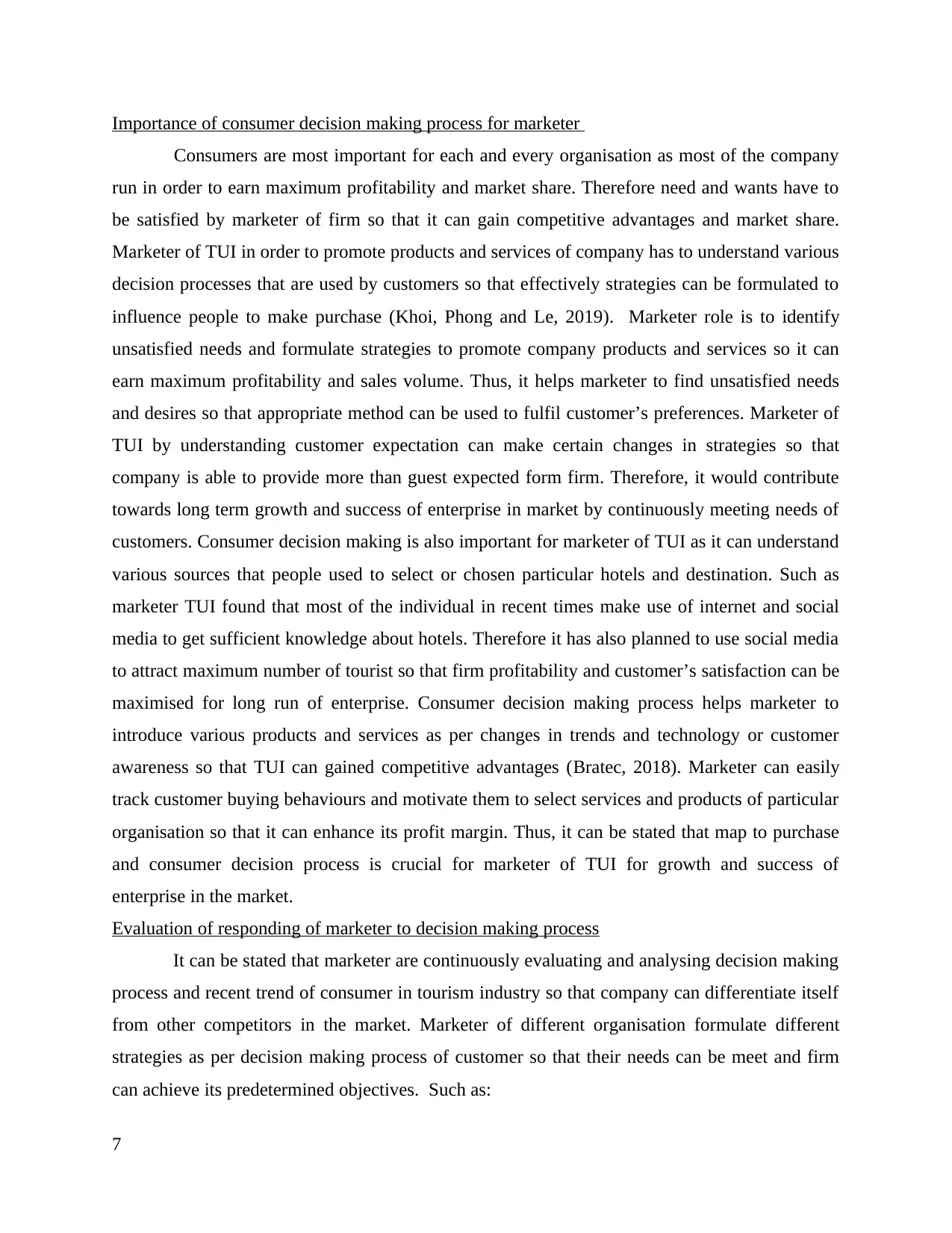
Importance of consumer decision making process for marketer
Consumers are most important for each and every organisation as most of the company
run in order to earn maximum profitability and market share. Therefore need and wants have to
be satisfied by marketer of firm so that it can gain competitive advantages and market share.
Marketer of TUI in order to promote products and services of company has to understand various
decision processes that are used by customers so that effectively strategies can be formulated to
influence people to make purchase (Khoi, Phong and Le, 2019). Marketer role is to identify
unsatisfied needs and formulate strategies to promote company products and services so it can
earn maximum profitability and sales volume. Thus, it helps marketer to find unsatisfied needs
and desires so that appropriate method can be used to fulfil customer’s preferences. Marketer of
TUI by understanding customer expectation can make certain changes in strategies so that
company is able to provide more than guest expected form firm. Therefore, it would contribute
towards long term growth and success of enterprise in market by continuously meeting needs of
customers. Consumer decision making is also important for marketer of TUI as it can understand
various sources that people used to select or chosen particular hotels and destination. Such as
marketer TUI found that most of the individual in recent times make use of internet and social
media to get sufficient knowledge about hotels. Therefore it has also planned to use social media
to attract maximum number of tourist so that firm profitability and customer’s satisfaction can be
maximised for long run of enterprise. Consumer decision making process helps marketer to
introduce various products and services as per changes in trends and technology or customer
awareness so that TUI can gained competitive advantages (Bratec, 2018). Marketer can easily
track customer buying behaviours and motivate them to select services and products of particular
organisation so that it can enhance its profit margin. Thus, it can be stated that map to purchase
and consumer decision process is crucial for marketer of TUI for growth and success of
enterprise in the market.
Evaluation of responding of marketer to decision making process
It can be stated that marketer are continuously evaluating and analysing decision making
process and recent trend of consumer in tourism industry so that company can differentiate itself
from other competitors in the market. Marketer of different organisation formulate different
strategies as per decision making process of customer so that their needs can be meet and firm
can achieve its predetermined objectives. Such as:
7
Consumers are most important for each and every organisation as most of the company
run in order to earn maximum profitability and market share. Therefore need and wants have to
be satisfied by marketer of firm so that it can gain competitive advantages and market share.
Marketer of TUI in order to promote products and services of company has to understand various
decision processes that are used by customers so that effectively strategies can be formulated to
influence people to make purchase (Khoi, Phong and Le, 2019). Marketer role is to identify
unsatisfied needs and formulate strategies to promote company products and services so it can
earn maximum profitability and sales volume. Thus, it helps marketer to find unsatisfied needs
and desires so that appropriate method can be used to fulfil customer’s preferences. Marketer of
TUI by understanding customer expectation can make certain changes in strategies so that
company is able to provide more than guest expected form firm. Therefore, it would contribute
towards long term growth and success of enterprise in market by continuously meeting needs of
customers. Consumer decision making is also important for marketer of TUI as it can understand
various sources that people used to select or chosen particular hotels and destination. Such as
marketer TUI found that most of the individual in recent times make use of internet and social
media to get sufficient knowledge about hotels. Therefore it has also planned to use social media
to attract maximum number of tourist so that firm profitability and customer’s satisfaction can be
maximised for long run of enterprise. Consumer decision making process helps marketer to
introduce various products and services as per changes in trends and technology or customer
awareness so that TUI can gained competitive advantages (Bratec, 2018). Marketer can easily
track customer buying behaviours and motivate them to select services and products of particular
organisation so that it can enhance its profit margin. Thus, it can be stated that map to purchase
and consumer decision process is crucial for marketer of TUI for growth and success of
enterprise in the market.
Evaluation of responding of marketer to decision making process
It can be stated that marketer are continuously evaluating and analysing decision making
process and recent trend of consumer in tourism industry so that company can differentiate itself
from other competitors in the market. Marketer of different organisation formulate different
strategies as per decision making process of customer so that their needs can be meet and firm
can achieve its predetermined objectives. Such as:
7
Paraphrase This Document
Need a fresh take? Get an instant paraphrase of this document with our AI Paraphraser
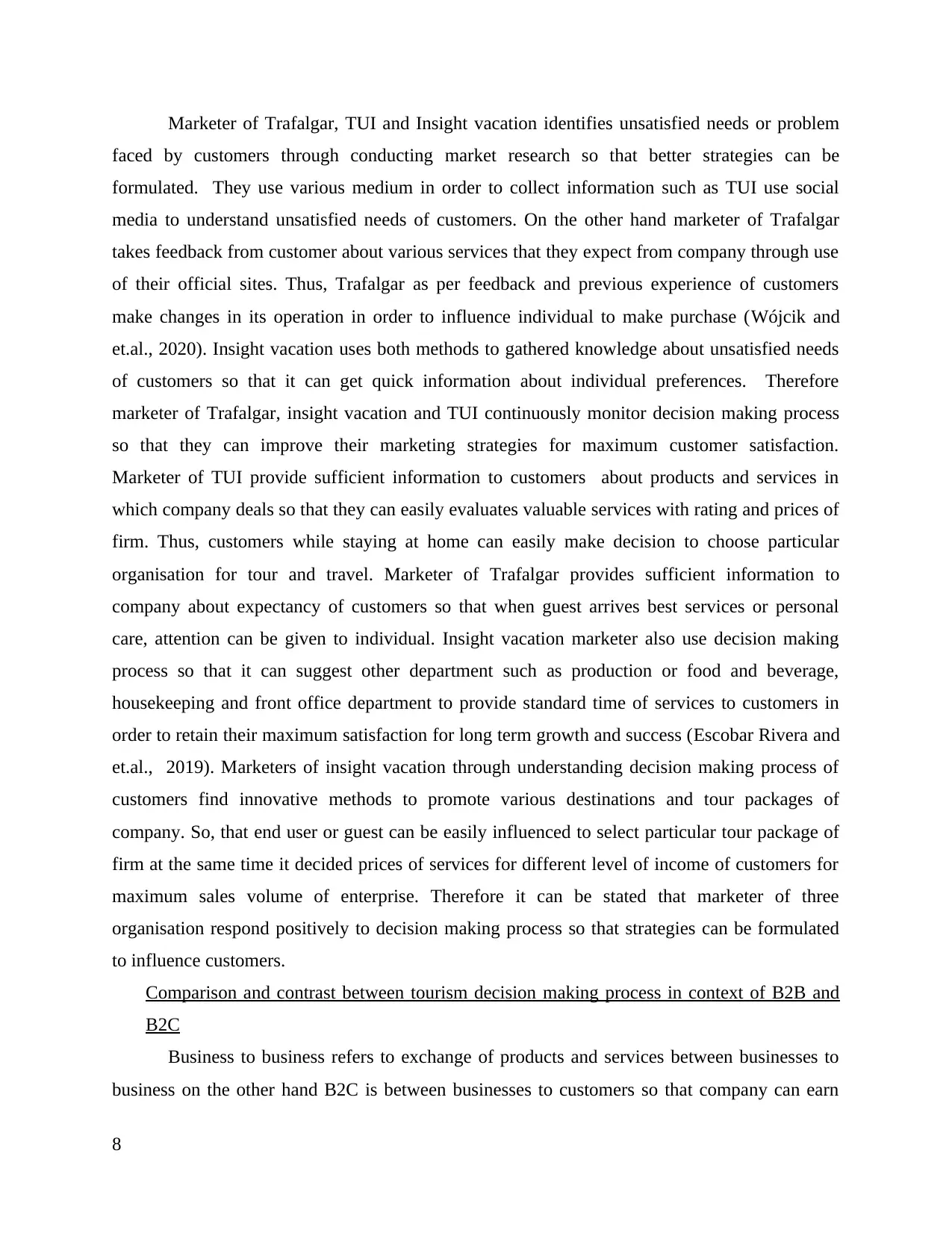
Marketer of Trafalgar, TUI and Insight vacation identifies unsatisfied needs or problem
faced by customers through conducting market research so that better strategies can be
formulated. They use various medium in order to collect information such as TUI use social
media to understand unsatisfied needs of customers. On the other hand marketer of Trafalgar
takes feedback from customer about various services that they expect from company through use
of their official sites. Thus, Trafalgar as per feedback and previous experience of customers
make changes in its operation in order to influence individual to make purchase (Wójcik and
et.al., 2020). Insight vacation uses both methods to gathered knowledge about unsatisfied needs
of customers so that it can get quick information about individual preferences. Therefore
marketer of Trafalgar, insight vacation and TUI continuously monitor decision making process
so that they can improve their marketing strategies for maximum customer satisfaction.
Marketer of TUI provide sufficient information to customers about products and services in
which company deals so that they can easily evaluates valuable services with rating and prices of
firm. Thus, customers while staying at home can easily make decision to choose particular
organisation for tour and travel. Marketer of Trafalgar provides sufficient information to
company about expectancy of customers so that when guest arrives best services or personal
care, attention can be given to individual. Insight vacation marketer also use decision making
process so that it can suggest other department such as production or food and beverage,
housekeeping and front office department to provide standard time of services to customers in
order to retain their maximum satisfaction for long term growth and success (Escobar Rivera and
et.al., 2019). Marketers of insight vacation through understanding decision making process of
customers find innovative methods to promote various destinations and tour packages of
company. So, that end user or guest can be easily influenced to select particular tour package of
firm at the same time it decided prices of services for different level of income of customers for
maximum sales volume of enterprise. Therefore it can be stated that marketer of three
organisation respond positively to decision making process so that strategies can be formulated
to influence customers.
Comparison and contrast between tourism decision making process in context of B2B and
B2C
Business to business refers to exchange of products and services between businesses to
business on the other hand B2C is between businesses to customers so that company can earn
8
faced by customers through conducting market research so that better strategies can be
formulated. They use various medium in order to collect information such as TUI use social
media to understand unsatisfied needs of customers. On the other hand marketer of Trafalgar
takes feedback from customer about various services that they expect from company through use
of their official sites. Thus, Trafalgar as per feedback and previous experience of customers
make changes in its operation in order to influence individual to make purchase (Wójcik and
et.al., 2020). Insight vacation uses both methods to gathered knowledge about unsatisfied needs
of customers so that it can get quick information about individual preferences. Therefore
marketer of Trafalgar, insight vacation and TUI continuously monitor decision making process
so that they can improve their marketing strategies for maximum customer satisfaction.
Marketer of TUI provide sufficient information to customers about products and services in
which company deals so that they can easily evaluates valuable services with rating and prices of
firm. Thus, customers while staying at home can easily make decision to choose particular
organisation for tour and travel. Marketer of Trafalgar provides sufficient information to
company about expectancy of customers so that when guest arrives best services or personal
care, attention can be given to individual. Insight vacation marketer also use decision making
process so that it can suggest other department such as production or food and beverage,
housekeeping and front office department to provide standard time of services to customers in
order to retain their maximum satisfaction for long term growth and success (Escobar Rivera and
et.al., 2019). Marketers of insight vacation through understanding decision making process of
customers find innovative methods to promote various destinations and tour packages of
company. So, that end user or guest can be easily influenced to select particular tour package of
firm at the same time it decided prices of services for different level of income of customers for
maximum sales volume of enterprise. Therefore it can be stated that marketer of three
organisation respond positively to decision making process so that strategies can be formulated
to influence customers.
Comparison and contrast between tourism decision making process in context of B2B and
B2C
Business to business refers to exchange of products and services between businesses to
business on the other hand B2C is between businesses to customers so that company can earn
8
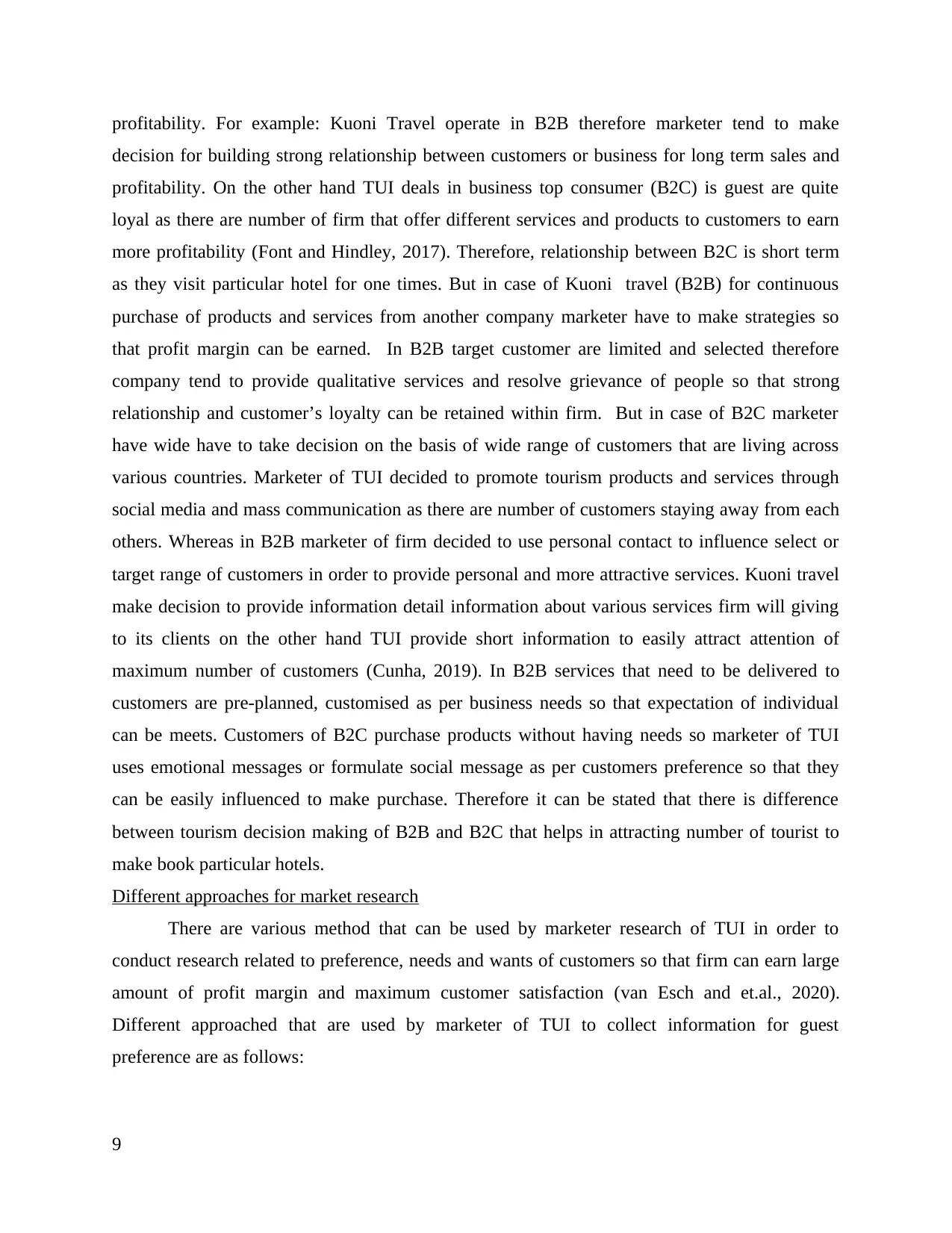
profitability. For example: Kuoni Travel operate in B2B therefore marketer tend to make
decision for building strong relationship between customers or business for long term sales and
profitability. On the other hand TUI deals in business top consumer (B2C) is guest are quite
loyal as there are number of firm that offer different services and products to customers to earn
more profitability (Font and Hindley, 2017). Therefore, relationship between B2C is short term
as they visit particular hotel for one times. But in case of Kuoni travel (B2B) for continuous
purchase of products and services from another company marketer have to make strategies so
that profit margin can be earned. In B2B target customer are limited and selected therefore
company tend to provide qualitative services and resolve grievance of people so that strong
relationship and customer’s loyalty can be retained within firm. But in case of B2C marketer
have wide have to take decision on the basis of wide range of customers that are living across
various countries. Marketer of TUI decided to promote tourism products and services through
social media and mass communication as there are number of customers staying away from each
others. Whereas in B2B marketer of firm decided to use personal contact to influence select or
target range of customers in order to provide personal and more attractive services. Kuoni travel
make decision to provide information detail information about various services firm will giving
to its clients on the other hand TUI provide short information to easily attract attention of
maximum number of customers (Cunha, 2019). In B2B services that need to be delivered to
customers are pre-planned, customised as per business needs so that expectation of individual
can be meets. Customers of B2C purchase products without having needs so marketer of TUI
uses emotional messages or formulate social message as per customers preference so that they
can be easily influenced to make purchase. Therefore it can be stated that there is difference
between tourism decision making of B2B and B2C that helps in attracting number of tourist to
make book particular hotels.
Different approaches for market research
There are various method that can be used by marketer research of TUI in order to
conduct research related to preference, needs and wants of customers so that firm can earn large
amount of profit margin and maximum customer satisfaction (van Esch and et.al., 2020).
Different approached that are used by marketer of TUI to collect information for guest
preference are as follows:
9
decision for building strong relationship between customers or business for long term sales and
profitability. On the other hand TUI deals in business top consumer (B2C) is guest are quite
loyal as there are number of firm that offer different services and products to customers to earn
more profitability (Font and Hindley, 2017). Therefore, relationship between B2C is short term
as they visit particular hotel for one times. But in case of Kuoni travel (B2B) for continuous
purchase of products and services from another company marketer have to make strategies so
that profit margin can be earned. In B2B target customer are limited and selected therefore
company tend to provide qualitative services and resolve grievance of people so that strong
relationship and customer’s loyalty can be retained within firm. But in case of B2C marketer
have wide have to take decision on the basis of wide range of customers that are living across
various countries. Marketer of TUI decided to promote tourism products and services through
social media and mass communication as there are number of customers staying away from each
others. Whereas in B2B marketer of firm decided to use personal contact to influence select or
target range of customers in order to provide personal and more attractive services. Kuoni travel
make decision to provide information detail information about various services firm will giving
to its clients on the other hand TUI provide short information to easily attract attention of
maximum number of customers (Cunha, 2019). In B2B services that need to be delivered to
customers are pre-planned, customised as per business needs so that expectation of individual
can be meets. Customers of B2C purchase products without having needs so marketer of TUI
uses emotional messages or formulate social message as per customers preference so that they
can be easily influenced to make purchase. Therefore it can be stated that there is difference
between tourism decision making of B2B and B2C that helps in attracting number of tourist to
make book particular hotels.
Different approaches for market research
There are various method that can be used by marketer research of TUI in order to
conduct research related to preference, needs and wants of customers so that firm can earn large
amount of profit margin and maximum customer satisfaction (van Esch and et.al., 2020).
Different approached that are used by marketer of TUI to collect information for guest
preference are as follows:
9
⊘ This is a preview!⊘
Do you want full access?
Subscribe today to unlock all pages.

Trusted by 1+ million students worldwide
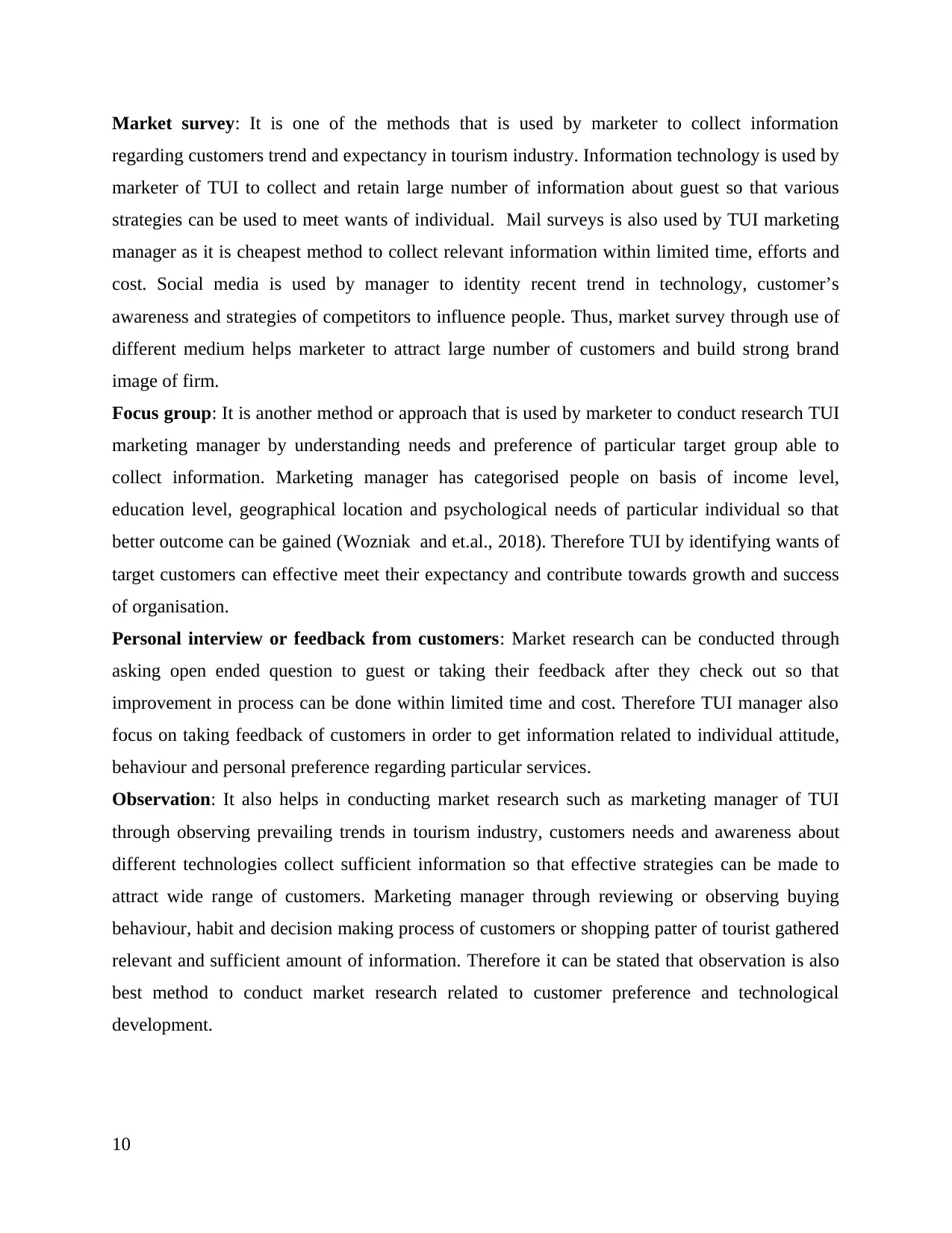
Market survey: It is one of the methods that is used by marketer to collect information
regarding customers trend and expectancy in tourism industry. Information technology is used by
marketer of TUI to collect and retain large number of information about guest so that various
strategies can be used to meet wants of individual. Mail surveys is also used by TUI marketing
manager as it is cheapest method to collect relevant information within limited time, efforts and
cost. Social media is used by manager to identity recent trend in technology, customer’s
awareness and strategies of competitors to influence people. Thus, market survey through use of
different medium helps marketer to attract large number of customers and build strong brand
image of firm.
Focus group: It is another method or approach that is used by marketer to conduct research TUI
marketing manager by understanding needs and preference of particular target group able to
collect information. Marketing manager has categorised people on basis of income level,
education level, geographical location and psychological needs of particular individual so that
better outcome can be gained (Wozniak and et.al., 2018). Therefore TUI by identifying wants of
target customers can effective meet their expectancy and contribute towards growth and success
of organisation.
Personal interview or feedback from customers: Market research can be conducted through
asking open ended question to guest or taking their feedback after they check out so that
improvement in process can be done within limited time and cost. Therefore TUI manager also
focus on taking feedback of customers in order to get information related to individual attitude,
behaviour and personal preference regarding particular services.
Observation: It also helps in conducting market research such as marketing manager of TUI
through observing prevailing trends in tourism industry, customers needs and awareness about
different technologies collect sufficient information so that effective strategies can be made to
attract wide range of customers. Marketing manager through reviewing or observing buying
behaviour, habit and decision making process of customers or shopping patter of tourist gathered
relevant and sufficient amount of information. Therefore it can be stated that observation is also
best method to conduct market research related to customer preference and technological
development.
10
regarding customers trend and expectancy in tourism industry. Information technology is used by
marketer of TUI to collect and retain large number of information about guest so that various
strategies can be used to meet wants of individual. Mail surveys is also used by TUI marketing
manager as it is cheapest method to collect relevant information within limited time, efforts and
cost. Social media is used by manager to identity recent trend in technology, customer’s
awareness and strategies of competitors to influence people. Thus, market survey through use of
different medium helps marketer to attract large number of customers and build strong brand
image of firm.
Focus group: It is another method or approach that is used by marketer to conduct research TUI
marketing manager by understanding needs and preference of particular target group able to
collect information. Marketing manager has categorised people on basis of income level,
education level, geographical location and psychological needs of particular individual so that
better outcome can be gained (Wozniak and et.al., 2018). Therefore TUI by identifying wants of
target customers can effective meet their expectancy and contribute towards growth and success
of organisation.
Personal interview or feedback from customers: Market research can be conducted through
asking open ended question to guest or taking their feedback after they check out so that
improvement in process can be done within limited time and cost. Therefore TUI manager also
focus on taking feedback of customers in order to get information related to individual attitude,
behaviour and personal preference regarding particular services.
Observation: It also helps in conducting market research such as marketing manager of TUI
through observing prevailing trends in tourism industry, customers needs and awareness about
different technologies collect sufficient information so that effective strategies can be made to
attract wide range of customers. Marketing manager through reviewing or observing buying
behaviour, habit and decision making process of customers or shopping patter of tourist gathered
relevant and sufficient amount of information. Therefore it can be stated that observation is also
best method to conduct market research related to customer preference and technological
development.
10
Paraphrase This Document
Need a fresh take? Get an instant paraphrase of this document with our AI Paraphraser
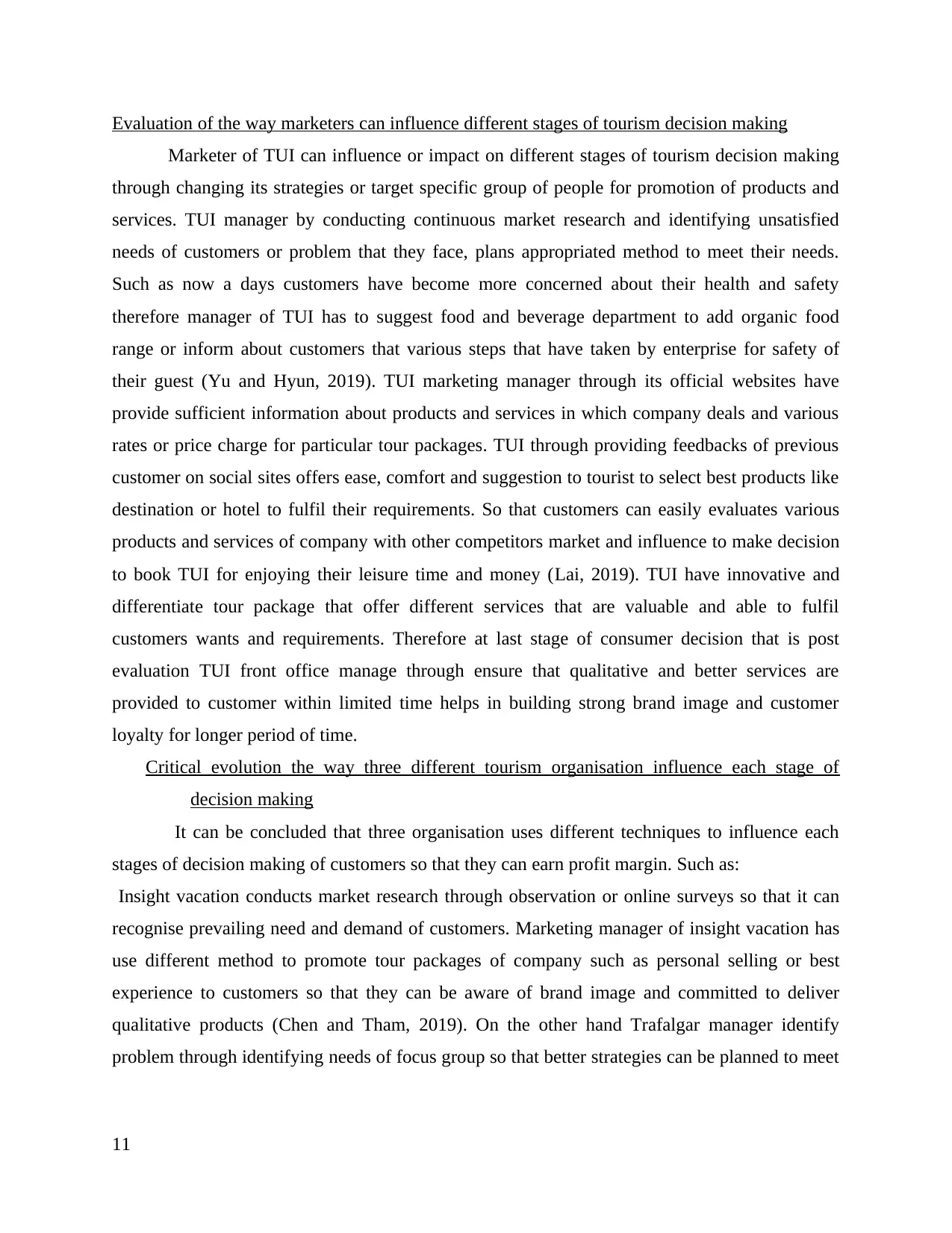
Evaluation of the way marketers can influence different stages of tourism decision making
Marketer of TUI can influence or impact on different stages of tourism decision making
through changing its strategies or target specific group of people for promotion of products and
services. TUI manager by conducting continuous market research and identifying unsatisfied
needs of customers or problem that they face, plans appropriated method to meet their needs.
Such as now a days customers have become more concerned about their health and safety
therefore manager of TUI has to suggest food and beverage department to add organic food
range or inform about customers that various steps that have taken by enterprise for safety of
their guest (Yu and Hyun, 2019). TUI marketing manager through its official websites have
provide sufficient information about products and services in which company deals and various
rates or price charge for particular tour packages. TUI through providing feedbacks of previous
customer on social sites offers ease, comfort and suggestion to tourist to select best products like
destination or hotel to fulfil their requirements. So that customers can easily evaluates various
products and services of company with other competitors market and influence to make decision
to book TUI for enjoying their leisure time and money (Lai, 2019). TUI have innovative and
differentiate tour package that offer different services that are valuable and able to fulfil
customers wants and requirements. Therefore at last stage of consumer decision that is post
evaluation TUI front office manage through ensure that qualitative and better services are
provided to customer within limited time helps in building strong brand image and customer
loyalty for longer period of time.
Critical evolution the way three different tourism organisation influence each stage of
decision making
It can be concluded that three organisation uses different techniques to influence each
stages of decision making of customers so that they can earn profit margin. Such as:
Insight vacation conducts market research through observation or online surveys so that it can
recognise prevailing need and demand of customers. Marketing manager of insight vacation has
use different method to promote tour packages of company such as personal selling or best
experience to customers so that they can be aware of brand image and committed to deliver
qualitative products (Chen and Tham, 2019). On the other hand Trafalgar manager identify
problem through identifying needs of focus group so that better strategies can be planned to meet
11
Marketer of TUI can influence or impact on different stages of tourism decision making
through changing its strategies or target specific group of people for promotion of products and
services. TUI manager by conducting continuous market research and identifying unsatisfied
needs of customers or problem that they face, plans appropriated method to meet their needs.
Such as now a days customers have become more concerned about their health and safety
therefore manager of TUI has to suggest food and beverage department to add organic food
range or inform about customers that various steps that have taken by enterprise for safety of
their guest (Yu and Hyun, 2019). TUI marketing manager through its official websites have
provide sufficient information about products and services in which company deals and various
rates or price charge for particular tour packages. TUI through providing feedbacks of previous
customer on social sites offers ease, comfort and suggestion to tourist to select best products like
destination or hotel to fulfil their requirements. So that customers can easily evaluates various
products and services of company with other competitors market and influence to make decision
to book TUI for enjoying their leisure time and money (Lai, 2019). TUI have innovative and
differentiate tour package that offer different services that are valuable and able to fulfil
customers wants and requirements. Therefore at last stage of consumer decision that is post
evaluation TUI front office manage through ensure that qualitative and better services are
provided to customer within limited time helps in building strong brand image and customer
loyalty for longer period of time.
Critical evolution the way three different tourism organisation influence each stage of
decision making
It can be concluded that three organisation uses different techniques to influence each
stages of decision making of customers so that they can earn profit margin. Such as:
Insight vacation conducts market research through observation or online surveys so that it can
recognise prevailing need and demand of customers. Marketing manager of insight vacation has
use different method to promote tour packages of company such as personal selling or best
experience to customers so that they can be aware of brand image and committed to deliver
qualitative products (Chen and Tham, 2019). On the other hand Trafalgar manager identify
problem through identifying needs of focus group so that better strategies can be planned to meet
11
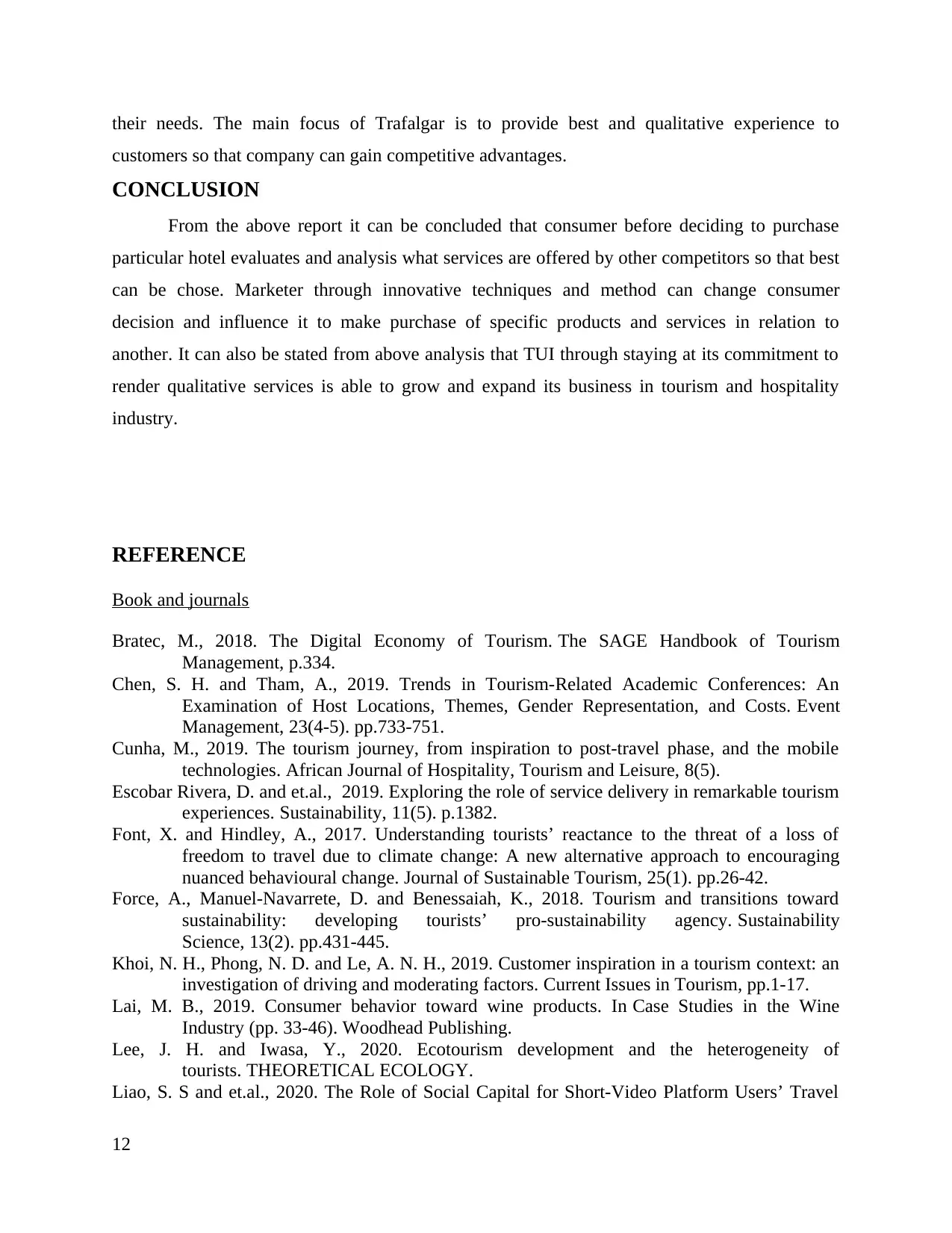
their needs. The main focus of Trafalgar is to provide best and qualitative experience to
customers so that company can gain competitive advantages.
CONCLUSION
From the above report it can be concluded that consumer before deciding to purchase
particular hotel evaluates and analysis what services are offered by other competitors so that best
can be chose. Marketer through innovative techniques and method can change consumer
decision and influence it to make purchase of specific products and services in relation to
another. It can also be stated from above analysis that TUI through staying at its commitment to
render qualitative services is able to grow and expand its business in tourism and hospitality
industry.
REFERENCE
Book and journals
Bratec, M., 2018. The Digital Economy of Tourism. The SAGE Handbook of Tourism
Management, p.334.
Chen, S. H. and Tham, A., 2019. Trends in Tourism-Related Academic Conferences: An
Examination of Host Locations, Themes, Gender Representation, and Costs. Event
Management, 23(4-5). pp.733-751.
Cunha, M., 2019. The tourism journey, from inspiration to post-travel phase, and the mobile
technologies. African Journal of Hospitality, Tourism and Leisure, 8(5).
Escobar Rivera, D. and et.al., 2019. Exploring the role of service delivery in remarkable tourism
experiences. Sustainability, 11(5). p.1382.
Font, X. and Hindley, A., 2017. Understanding tourists’ reactance to the threat of a loss of
freedom to travel due to climate change: A new alternative approach to encouraging
nuanced behavioural change. Journal of Sustainable Tourism, 25(1). pp.26-42.
Force, A., Manuel-Navarrete, D. and Benessaiah, K., 2018. Tourism and transitions toward
sustainability: developing tourists’ pro-sustainability agency. Sustainability
Science, 13(2). pp.431-445.
Khoi, N. H., Phong, N. D. and Le, A. N. H., 2019. Customer inspiration in a tourism context: an
investigation of driving and moderating factors. Current Issues in Tourism, pp.1-17.
Lai, M. B., 2019. Consumer behavior toward wine products. In Case Studies in the Wine
Industry (pp. 33-46). Woodhead Publishing.
Lee, J. H. and Iwasa, Y., 2020. Ecotourism development and the heterogeneity of
tourists. THEORETICAL ECOLOGY.
Liao, S. S and et.al., 2020. The Role of Social Capital for Short-Video Platform Users’ Travel
12
customers so that company can gain competitive advantages.
CONCLUSION
From the above report it can be concluded that consumer before deciding to purchase
particular hotel evaluates and analysis what services are offered by other competitors so that best
can be chose. Marketer through innovative techniques and method can change consumer
decision and influence it to make purchase of specific products and services in relation to
another. It can also be stated from above analysis that TUI through staying at its commitment to
render qualitative services is able to grow and expand its business in tourism and hospitality
industry.
REFERENCE
Book and journals
Bratec, M., 2018. The Digital Economy of Tourism. The SAGE Handbook of Tourism
Management, p.334.
Chen, S. H. and Tham, A., 2019. Trends in Tourism-Related Academic Conferences: An
Examination of Host Locations, Themes, Gender Representation, and Costs. Event
Management, 23(4-5). pp.733-751.
Cunha, M., 2019. The tourism journey, from inspiration to post-travel phase, and the mobile
technologies. African Journal of Hospitality, Tourism and Leisure, 8(5).
Escobar Rivera, D. and et.al., 2019. Exploring the role of service delivery in remarkable tourism
experiences. Sustainability, 11(5). p.1382.
Font, X. and Hindley, A., 2017. Understanding tourists’ reactance to the threat of a loss of
freedom to travel due to climate change: A new alternative approach to encouraging
nuanced behavioural change. Journal of Sustainable Tourism, 25(1). pp.26-42.
Force, A., Manuel-Navarrete, D. and Benessaiah, K., 2018. Tourism and transitions toward
sustainability: developing tourists’ pro-sustainability agency. Sustainability
Science, 13(2). pp.431-445.
Khoi, N. H., Phong, N. D. and Le, A. N. H., 2019. Customer inspiration in a tourism context: an
investigation of driving and moderating factors. Current Issues in Tourism, pp.1-17.
Lai, M. B., 2019. Consumer behavior toward wine products. In Case Studies in the Wine
Industry (pp. 33-46). Woodhead Publishing.
Lee, J. H. and Iwasa, Y., 2020. Ecotourism development and the heterogeneity of
tourists. THEORETICAL ECOLOGY.
Liao, S. S and et.al., 2020. The Role of Social Capital for Short-Video Platform Users’ Travel
12
⊘ This is a preview!⊘
Do you want full access?
Subscribe today to unlock all pages.

Trusted by 1+ million students worldwide
1 out of 13
Related Documents
Your All-in-One AI-Powered Toolkit for Academic Success.
+13062052269
info@desklib.com
Available 24*7 on WhatsApp / Email
![[object Object]](/_next/static/media/star-bottom.7253800d.svg)
Unlock your academic potential
Copyright © 2020–2026 A2Z Services. All Rights Reserved. Developed and managed by ZUCOL.





